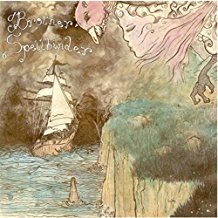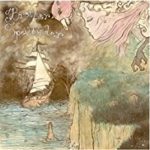
Alzara Getz’s alter-ego carries the cumbersome name of Brother Spellbinder. Musically, the San Francisco-based band is anything but awkward. Getz sets a course for herself and her band that takes her listeners inside, outside, and somewhere between. It’s an often exhilarating sound environment that is unique and quietly rewarding. In performance, she dances melodically in a distinctive environment of costume and setting. You can almost visualize this on the band’s EP, When the Earth Was Still Flat.
Getz is the daughter of another Bay Area talent, the iconic Dave Getz, drummer of the seminal rock band Big Brother and the Holding Company, Janis’ original Cheap Thrills band. I lived in Dave’s Fairfax house at one time but have only recently discovered Alzara’s work. I’ve been glad I did, as she is not only a talented singer, player, and songwriter, but, in subtle ways, a ground breaker. Each tune takes its own direction, worth the trip, rewarding in its pensive exploration.
As she says in “Flicker,” “A voice starts to whisper your name, burst into flame, fear has no claim. And the stars align.” Her lyrics are part of the subtle power of Brother Spellbinder’s songs. Other components of that power are the talented partners in the band. These include co-founder Jamie Wilson on guitar, Steve Bollhoefer on violin and mandolin, concert cellist Gabriel Beistline, and drummer Steve La Porta. The cello has a fibrous anchoring in the ensemble sound, like roots emanating heat into cold earth. The overall sound is warm, but also mellow and with a tendency to create and, at the same time, counter, pathos.
This makes sense in terms of Alzara’s background in mental health, as a public health social worker. Focused now on her music, Alzara recorded parts of “When the Earth Was Flat” in (what’s been called) Meerna Manor, Dave and Joan Getz’s marvelous house and studio on the hill at the base of beautiful Mt. Tamalpais (where I’d lived in the early 1990’s).
Another source of the angst/anti-angst texture of the music is its gypsy folk characteristic, which comes full—course in a tune like “Katyusha,” a Russian folk song. Alzara Getz’s son carried the artistic torch in providing the artwork for the record’s cover. Jazzy improve takes place at times as when drummer La Porta does percussion on a typewriter for the band’s NPR Tiny Desk performance. I believe Dad, Dave, has guested for her at times on percussion as well.
The theatrical element described above is further evidenced in multi-media backdrops at some of her shows, and you can hear it in the music. Behind the theater are large ideas as she once described in an article in Vents Magazine: When the earth was still flat, one could fall off the edge and not know what she would find there. Cartographers made maps of a flat world that was populated by strange creatures and unexplored mysterious territories. Perhaps the words conjure an image for me of someone traveling to the ends of the earth, much like the hero or heroine in a fairytale. This person lives in a time of infinite possibility, magical creatures, eternal love.”
Fall off the earth with this spellbinder, as they termed spiritualists of the 19th Century, and you’ll be rewarded with both contact with the earth’s rich surface and the mystery of exploring the wider world around it.



No Comments comments associated with this post